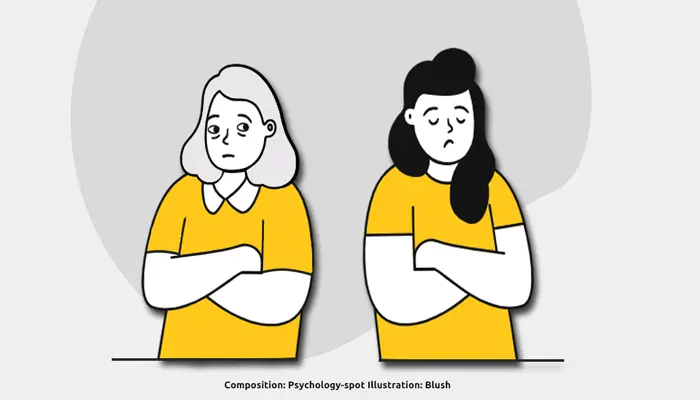
When children are small, the problems are usually small. As they grow, problems become more complex and conflicts often appear that cloud the relationship. Despite this, many parents and children struggle to get along. They try to keep the relationship afloat, but something pushes them to the bottom.
Sometimes the reason for this distancing is not a dark emotional trauma carried over from childhood or a latent conflict rooted in the depths of the unconscious, but rather something much more banal: they have nothing – or almost nothing – in common. And when those shared assumptions don’t exist, it’s difficult to connect emotionally.
The struggle to connect on a deep level
In some families, members love the idea of spending time together, but when they get together, they have a hard time connecting. It’s as if there is an invisible wall between them. They fail to find common ground beyond the kinship that unites them. They are perceived as strangers and conversation is resisted, so the feeling of discomfort does not take long to set in.
Sometimes, that disconnection is not bidirectional. That is, one member may feel that they connect, but others perceive that it is a superficial connection. In fact, it is not unusual for many parents to struggle to connect with their children and engage in conversation, but they do not find it meaningful.
Obviously, the opposite can also happen: children may try to involve their parents in activities that they are passionate about, but they do not perceive enthusiasm from the other party or they do not arouse the interest they expected.
In the long run, failed attempts to build bridges can end up increasing the psychological distance between parents and children. Each superficial encounter leaves a feeling of emptiness that generates growing frustration, so relationships with adult children grow increasingly cold and the gap deepens.
Every unsuccessful attempt to connect becomes a Band-Aid on a deep wound, often only amplifying the discomfort that superficiality already creates. Faced with this disconnection, children or parents may begin to look for excuses with a veneer of validity to stop seeing each other. Is it possible to solve it? How to improve your relationship with adult children?
First of all: What has caused the distance?
Understanding what has generated this type of emotional alienation is the first step to shortening the distance. This phenomenon is more common when a parent or child adopts a new religion, lifestyle, or hobby so encompassing that it ends up limiting their universe of interests, leaving little room for other topics of conversation.
It also occurs when parents or children have taken different paths or have stopped seeing each other for a long time, so that their priorities or way of seeing life have radically changed and the seams that previously united them have loosened.
In other cases, this disconnection is long-standing since, at the end of the day, children are not a faithful copy of their parents. Sometimes children begin to develop different interests, but while living under the same roof as their parents, the daily logistics were enough for everyone to feel connected. On the other hand, when the child grows up and takes his direction, the forking of paths becomes more evident.
Nor should we forget an old popular adage that says that “people are more like their time than their parents .” Although the family imprint is undeniable, every era generates a homogeneity with a vocation to persevere. It behaves like an ecosystem of repeated models, shared customs and ways of thinking.
On many occasions, the cultural models of parents and children simply differ, so their realities and forma mentis fail to find those essential points of overlap to connect.
And when that happens, when beliefs, ideas, opinions, aspirations and realities differ too much, is generated an uncomfortable silence that resists even well-intentioned attempts to find the spark that generates the long-awaited bond to improve the relationship with adult children.
How to improve the relationship with adult children by building a solid bridge?
Families can try to bridge the gap, but only if everyone has the desire to connect. Parents’ motivation to improve relationships with adult children or children’s desire to connect more with their parents are not enough, everyone has to pull together.
And the way is not to rack your brain looking for that activity that allows you to connect, but to listen to the other, with authentic curiosity and total openness. It’s as simple as it seems. And at the same time so difficult.
The key is not to get your child to like what you like, or for your parents to share your point of view, but to open up to others and try to understand them. And that is achieved with intellectual humility and empathy . We are all different. And that is precisely what enriches us, as long as we know how to appreciate it.
You may not be able to talk to your parents about the current influencer or the latest fashion, but you can learn from their life experience. And perhaps parents believe that their children are a little immature or that their interests do not have much substance, but they can learn new things from them to function better in today’s world.
With a little effort on both sides, a richer and more interesting bond can be created. We must make an effort to value what the other person can contribute and accept them as they are, without expecting them to change to fit in with us.
And in some cases, you will also have to recognize that you may not be able to achieve the level of closeness and intimacy you want because both worlds are separated by a galaxy. It may not be ideal, but it doesn’t have to be a disaster, as long as the relationship between parents and their adult children remains within the boundaries of mutual respect and recognition.




Leave a Reply